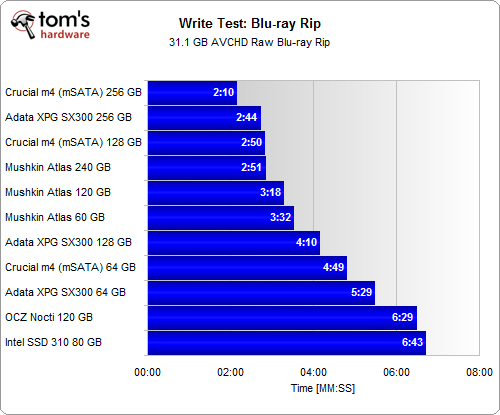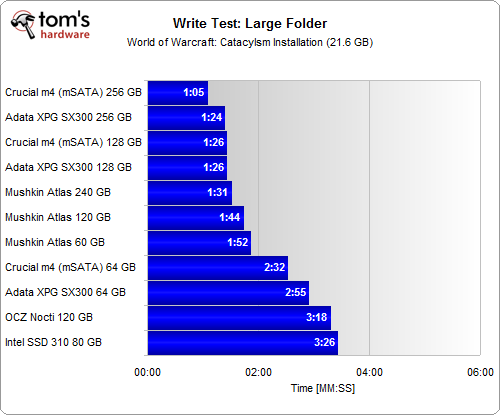Round-Up: 10 mSATA SSDs From Adata, Crucial, Mushkin, And OCZ
Real-World File Transfer Tests
Iometer is a great tool for helping us isolate the behavior of storage devices in very specific cases. But simply running 4 KB blocks of random data or 128 KB chunks of information sequentially through a drive doesn't give us a true sense of performance in a real-world environment. And that's because most real-world workloads aren't nearly as single-dimensional.
So, we also have a couple of real-world file transfer tests, both of which are indicative of write performance as we move information off of a 240 GB Vertex 3 and onto each of these mSATA-based SSDs.
The first test involves one large media file, which is incompressible due to its already-encoded container. It might surprise you to see so much differentiation between the various drives. However, at the top end, Crucial's m4 isn't affected by the type of data we're moving. And, at the bottom, Intel's SSD 310 only populates five of its controller's 10 available channels, helping explain why it doesn't fare as well.
In fact, we can do a bit of math to figure out just how well each of these SSDs matches up to its rated specifications. Intel claims the SSD 310 80 GB can sustain 70 MB/s sequential writes. We show it doing 79 MB/s. Crucial says the 256 GB m4 should be able to write at up to 260 MB/s. We have it pegged at 244 MB/s. Overall, these numbers look pretty darned close.
So yes, while the responsiveness of an SSD is universally better than what you get from a hard drive, there can be some pretty substantial differences in performance when it comes to moving around lots of information.
Here, we're writing a large folder of files that blend random and sequential accesses. Much of this data is already compressed into large files by Blizzard, so we're not sure how much more SandForce's DuraWrite technology can do to improve performance.
Now we see Intel's SSD 310 doing 107 MB/s, while Crucial's m4 smokes along at 340 MB/s. Both of those figures are in excess of what each vendor rates its product for. However, we ran each drive twice to be sure they were correct and saw consistent results within four seconds from one transfer to the next.
Get Tom's Hardware's best news and in-depth reviews, straight to your inbox.
Notable yet again is how much worse the 60/64 GB models do compared to the 120/128 and 240/256 GB drives. That information is particularly important as we come up with some general recommendations on the next page.
Current page: Real-World File Transfer Tests
Prev Page PCMark 7 And Power Consumption Next Page mSATA: Little Dimensions Can Still Mean Big Performance-
trumpeter1994 I just got a 256GB Crucial m4 msata SSD for the laptop I'm typing from. I love the thing its so nice to have in my y580Reply -
weatherdude Nice to see mSATA SSD's performing so well. Looks like laptops can now benefit from SSD's without having to compromise on storage space by giving up HDD's.Reply
Also the award is something new. I guess the "Recommended" and "Approved" awards are gone for 2013? -
cangelini weatherdudeNice to see mSATA SSD's performing so well. Looks like laptops can now benefit from SSD's without having to compromise on storage space by giving up HDD's.Also the award is something new. I guess the "Recommended" and "Approved" awards are gone for 2013?Approved is still one of the awards we're using. Recommended Buy is replaced by Smart Buy to better-convey the emphasis on value, and Best Of is replaced by Elite to better convey the emphasis on "this is the best damn product in the segment that we can recommend." Elites will continue to be something you rarely ever see, except when we want to make a point to honor a piece of hardware.Reply -
abbadon_34 Seems kinda underwhelming, seeing only 4 in the market, 2 of them years old. Ironically puts Intel's SSD and OCZ's in the same boat.Reply -
tsnor Excellent article. Nice. Much better than typical.Reply
Some discussion of trim, and the effects of using drives with a few days of use would have been good. The assumption is that the 'clean drive' performance tested is a good indicator of what people will see when they've used the drive for a month needs to be tested, the perforamnce order might change sharply. A 6 hour random write workload would go a long way to showing what to expect. Especially given the broken TRIM on SF 5 firmware and the slow speed of the fixes to existing SF drives. -
jaquith Yep, no argument the Crucial m4 mSATA 256 GB stole the show. It's both the fastest & cheapest -- what's the catch? I hope none.Reply
BTW - $179.99 or $0.70/GB (Promo Code: EMCYTZT2757) NewEgg - http://www.newegg.com/Product/Product.aspx?Item=N82E16820148613 Just noticed the sale from a NewEgg email. -
Onus I've got a 256GB Crucial M4 in the little clip on my Maximus V Gene as the boot drive. It's been performing flawlessly there for months.Reply
That's a bit crazy I know, but I had originally had it on the underside of an AZRock Z77E-ITX board until that board died. -
sna May I ask why is the Samsung 830 msata drive not present in this review?Reply
as I recall it outperforms the M4 and all the drives here.
-
edlivian oh great, now newegg and crucial are going to jack up the prices on the m4 line.Reply
I love the m4 drives, but now its going to get too much attention. -
jacobdrj snaMay I ask why is the Samsung 830 msata drive not present in this review?as I recall it outperforms the M4 and all the drives here.Because they are pretty much EOL with the 840 series out.Reply
I want to know when AMD laptops are going to start including msata slots... It is the budget laptop guys that would get the best benefit from msata with a standard HDD together...

